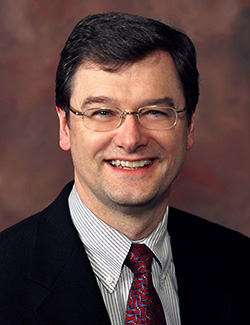Relieving patients of fatigue, shortness of breath, chest discomfort and other symptoms.
Chester County Hospital’s Heart Valve Center is in its second year of treating patients with heart valve disease. Since its opening in September 2015, the center has been providing local access to the region’s most comprehensive range of treatment options for valve disease available. Patients have access to an interdisciplinary team of local cardiologists, cardiac surgeons, and other specialists, including physicians from the Hospital of the University of Pennsylvania.

Dr. Weiss in the operating room.
“Over the past year and a half, we’ve learned there is a lot of valve disease in our community. We’ve been able to create awareness throughout the health care field so primary care doctors and specialists outside of cardiology are thinking about and discovering heart valve disease in patients more often than they used to,” says Steven J. Weiss, MD, Chief of Cardiac Surgery.
Valve disease is a growing disease management problem for cardiac patients in the United States. As the population ages, aortic valves begin to wear out. One of the reasons valve disease goes undiagnosed is because many are tuned into the classic signs of a heart attack or coronary artery disease, without realizing that valve disease, which has a different constellation of symptoms, is very common, too. “It’s a sneaky, insidious disease that impairs your ability to be active and breathe well. It happens at a time in life when people begin chalking it up to being older, saying ‘Of course it’s happening to me, I’m 70,’ but then it turns out, it’s not really aging at all. These are the patients we are trying to find so that we can help them live longer, more active and happy lives,” adds Dr. Weiss.
The average patient at the Heart Valve Center is 80-years-old. Before coming to the center, many of these patients thought their symptoms were caused by another ailment, such as asthma or poor lung function. Patients are often surprised and thrilled to hear that even at 80-years-old or older, a heart valve repair can help set the clock back and bring back their energy.
“Our Heart Valve Center has provided the ability for patients to stay close to home while still having an exceptional team of providers to discuss their available options for treatment. Each patient has the benefit of peer review by several different specialists while also being with their regular physician,” says Timothy J. Boyek, MD, Medical Director of Cardiac Diagnostic Interventional Catheterization Laboratories.


Steven Weiss, MD Timothy Boyek, MD
One of the revolutionary procedures that is helping restore vitality in the community is called TAVR – Transcatheter Aortic Valve Replacement. TAVR is a catheter-based procedure that replaces the aortic valve without having open heart surgery, which can be risky for some patients. “Prior to TAVR, there were some patients that could not have open heart surgery and had to live with their ailments. Now, we can treat these patients and they look great and are living for years and years,” says Dr. Weiss.
Patients being considered for TAVR receive specialized diagnostic testing and an evaluation from two heart surgeons to approve the procedure. The testing and initial evaluation is performed at the Heart Valve Center at Chester County Hospital and the final evaluation and surgery is performed at the Hospital of the University of Pennsylvania. Once the procedure is complete, post-operative care is performed back home in Chester County.
“When patients present with aortic valve disease, they often experience shortness of breath, chest discomfort, dizziness, severe fatigue, or swelling of the legs. After having the TAVR procedure, patients feel better within 48-72 hours! They come back feeling stronger, having more energy and a brighter mind since they have more blood flow throughout their entire body,” says Dr. Boyek.
Previously, heart valve disease was challenging to manage throughout a patient’s lifetime because of the progressive stages of the disease. Treatment went back and forth between the primary care physician and various specialists. The Heart Valve Center was designed to ease this challenge by allowing easy communication with the entire interdisciplinary team to effectively manage the patient’s care. If a test or procedure is performed, the entire care team receives an alert, including the referring physician. This notification system allows the Heart Valve Center to track and follow patients to make sure they are being treated properly so no patient falls through the cracks.
“We’ve established a hospital program that works for the valve patient, not for the heart surgeon or the cardiologist or for any particular private physician. It’s a tracking system and a friendly ‘concierge’ for the patient that makes it easier to navigate the stages of the disease for everyone – the patient, physicians, staff and families,” adds Dr. Weiss.
Find out your personal risk for heart disease by taking an online cardiac risk assessment, such as Chester County Hospital’s “Heart Tracks.” It allows you to compare your actual age to your heart’s biological age, estimate your risk of developing cardiovascular disease and prioritize your most harmful cardiovascular risk factors. Take the Assessment Now!